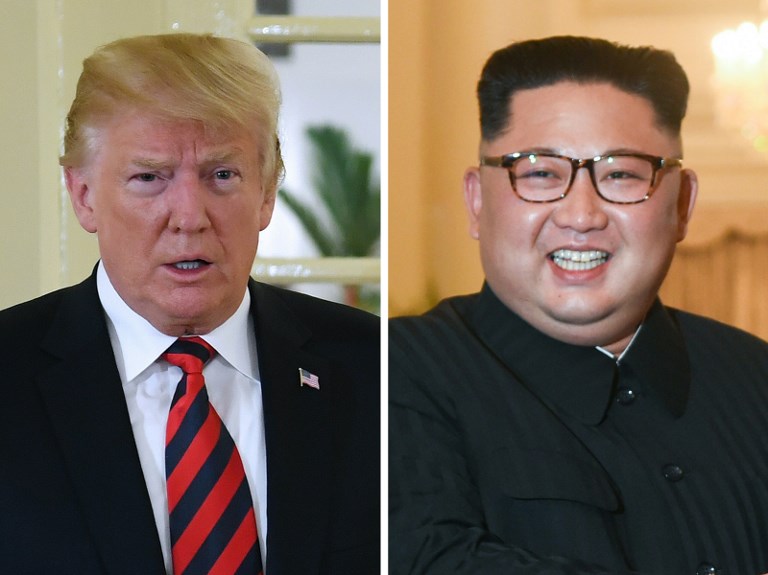
Kim Jong Un and Donald Trump will meet on June 12 for an unprecedented summit in an attempt to address the last festering legacy of the Cold War, with the US president calling it a “one time shot” at peace. / AFP PHOTO / SAUL LOEB AND ROSLAN RAHMAN
by Andrew BEATTY
Agence France-Presse
SINGAPORE, Singapore – Donald Trump and Kim Jong Un will make history on Tuesday, becoming the first sitting US and North Korean leaders to meet, shake hands and negotiate to end a decades-old nuclear stand-off.
The extraordinary summit — unthinkable only months ago — comes after the two nuclear-armed foes appeared on the verge of conflict late last year as they slung personal insults and Kim conducted nuclear and missile tests.
Trump called on the international community to exert “maximum pressure” to buckle Kim’s regime and threatened to unleash “fire and fury like the world has never seen” if Pyongyang continued to threaten the US.
For his part, Kim called Trump a “mentally deranged US dotard” and said he would “tame” him, “with fire”.
That will seem a distant memory later Tuesday amid the palms and whitewashed walls of Singapore’s ultra-exclusive Capella Hotel, where the two men will walk towards each other and then sit down for an initial half-day of meetings with ramifications for the entire world.
It is a historic meeting for both men — perhaps comparable to president Richard Nixon’s 1972 visit to China, or Ronald Reagan’s summit 1986 with Mikhail Gorbachev in Reykjavik.
It is potentially legacy-defining — as long as they can disprove critics’ fears that the meeting will be more about drama than detail.
The North has promised to give up its weapons in the past, while a long history of previous agreements have ultimately foundered.
“If there is no statement of intentions to move toward a peace treaty, if there’s no statement from the North Korean side on denuclearisation, we’re going to find ourselves very quickly in a very hollow summit,” said Ryan Hass of the Brookings Institution.
If that happened, he added, “quickly we’ll move into a space of mutual recrimination and finger-pointing about whose fault it was”.
On the eve of the summit, Trump — who is due to leave Singapore on Tuesday evening — said optimistically: “I just think it’s going to work out very nicely.”
– Hugely symbolic talks –
The pair — Kim in his thirties and consolidating his dictatorship, Trump in his seventies and struggling to bend Washington to his impetuous will — are unlikely protagonists, both instantly recognisable and larger-than-life.
But their work this week is deadly serious.
Washington and Pyongyang are still technically at war, even if the mortars, carbines and gunships of the bloody 1950s conflict have long since fallen silent.
And the totalitarian regime has made rapid progress towards marrying nuclear and missile technology that would put Los Angeles, New York and Washington within striking distance of a nuclear holocaust.
The United States says that is unacceptable and will be dealt with, one way or another.
But for North Korea the mere fact of the talks is a hugely symbolic advance.
For its leader, standing as an equal beside the US president in front of a phalanx of cameras is a goal the pariah state has sought for decades, with critics charging that it legitimises one of the most ruthless regimes.
On Monday evening Kim — accompanied by a phalanx of bodyguards and his personal television crew — took a night-time stroll on the Singapore waterfront, even posing for grinning selfies with the city-state’s foreign minister.
– ‘Brighter future’ –
Yet it remains far from clear that Pyongyang is willing to give up its nuclear weapons, which it says it needs to defend itself against a US invasion.
On the eve of the meeting, aides from both sides were still scrambling to narrow yawning differences over “denuclearisation”, which means vastly different things to the two parties.
Trump will use what he says are long-honed instincts to see whether Kim if bluffing, buying time or serious.
Secretary of State Mike Pompeo said on Monday that the United States was willing to offer the regime “unique” security guarantees, to “provide them sufficient certainty that they can be comfortable that denuclearisation is not something that ends badly for them”.
Kim and Trump will first meet one-on-one in a closed session, before a larger meeting with key advisers, US officials said.
But Pompeo signalled that the summit was likely to be the start of a longer process of negotiation, and warned the United States would not be “duped”, with nothing less than complete, verifiable and irreversible denuclearisation considered.







